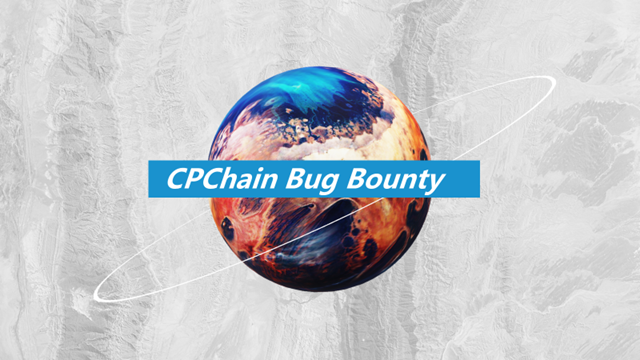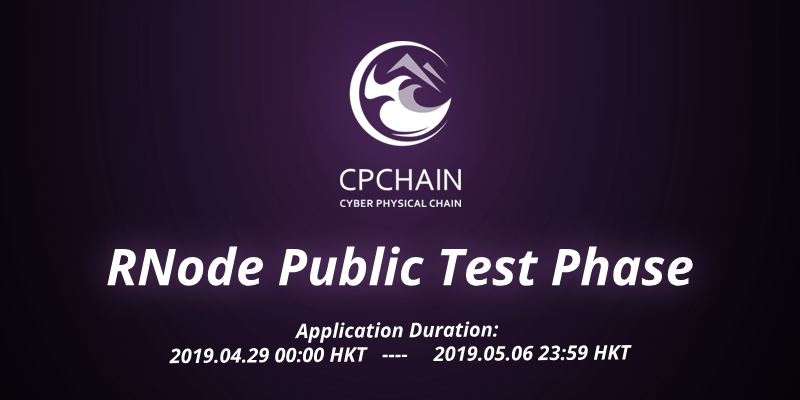CPChain: Ask Me Anything - RNode Ecosystem Version
by CPChain at Sept. 9, 2018

CPChain announced the RNode Ecosystem Structure on 8/31/2018. It is a proud of the team to receive so many precious feedback on it.
In the last few days, CPChain created a Reddit Thread to collect questions from the community, which aroused a great wave of discussion. Among so many precious questions, we picked out some of them, which have received a higher upvote rate, to answer in this article.
In the medium article it is stated that not only Rnode, but also economic nodes require a 90 day lockup. Since mainnet is scheduled for october, does this mean that for all nodes the first rewards will be payed out in January 2019?
The team is currently setting up the plan. The extra reward for Committee Nodes (that comes with RNodes) are bound to be scheduled after the Mainnet launch. However, the team is actively discussing about the starting date for basic rewards for both Economy Nodes and RNodes. It might start very soon. The standard will be at a minimum lock-up amount of 20,000 CPC with 90 days lock-up session.
We will reveal the details once it is finalized. Please stick to our official announcement on Twitter, Medium, Reddit, Telegram, Discord and WeChat.
As rnodes wants to become elected, holders need to have transparent information on how the 5 reputation characteristics work out. As example, what can a 200k rnode do to improve chances to win over a 2m rnode. Can you ellaborate on reputation characteristics for: Transaction, Proxy and Data Contribution. Does geolocation of the node and hardware has influence on the reputation?
Transactions refer more to the buying side contribution on CPChain. For example, buying IoT data on PDash Marketplace. Proxy is also related to PDash, in the PDash Marketplace, we will provide users chances to lend their computing power and serve as a proxy in the transaction flow. They will get reputation values and CPC in return.
Data Contribution refers more to the selling side contribution on CPChain, for example, selling data on PDash Marketplace. Geo-location will not have an influence on reputation. But hardware will have some indirect influence in that the better hardware you have, the more contribution you might bring to CPChain in a certain time frame.
Could you please explain the the minimum and recommended hardware specifications including bi-directional bandwidth requirements. Does it matter if the processor is Intel or AMD? Will there be a need for a graphics card? Thank you!
For now there is not a detailed hardware and internet condition requirement. We will announce it later on. However, one thing we can tell now is that the RNode hardware requirement will not be hard to achieve.
if I agree to the lock up 200K for the R-Node rewards can you confirm that it WILL be elected at some point as there is little benefit agreeing to the lock-up if holders with much larger holdings are always elected instead of me with the 40–50% weighting favoring larger holders.
The selection algorithm to pick out the Committee Members (30–35) actually has a distribution ratio based on reputation value. For example, 50% of the committee will be picked out from high reputation value (RV) candidates, 35% will be picked out from middle range RV candidates and 15% will be picked out from lower RV candidates. In this way, we want to ensure that for each committee round we will have a relatively fair and controversial pool of people in the committee.
Are returns given from the first day of the 90 day period or after the last day. Is it possible to add more coins to the locked wallet of the RNode in between the 90 days on a daily basis or is it only possible every 90 days.
Yes, returns are given from the first day. The amount locked in the RNode cannot be changed because the amount is locked-up in the Smart Contract, which means you need to decide the amount in advance. Once it is locked-up in the Smart Contract it cannot be touched anymore.
All R Node holders want to maximize their chances to be often elected as committee member. Though the chances are influenced for a great deal by the cpc amount, but there is also some randomness involved. Will it make sense to split the capital into separate 200K nodes? A proper decision could have a profound effect on the ROI.
Say if you have 1 million CPC, instead of spliting them into 5 Rnodes and allocating your balance to 5 nodes/accounts, depositing all coins under 1 node/account would give you better possibilities to be selected, and of course, reach a higher roi. The reason behind this is that the RVAP calculation cares more about balance.
When will the team try to solve the liquidity problem currently experienced? Users are not able to buy or sell due to the lack of real volume on exchanges
We have already start to looking into the issue and preparing appropriate actions against the problem.
when the first round of committee nodes are being selected, are they automatically getting benefit to the second, third, n- round because of reputation? This leads to this: do 200k RNodes have any reasonable chance to get elected to Committee node?
A Committee Node can get Reputation Value (RV) immediately after the tenure if they meet the following two requirement:
1. Successfully add a new block.
2. Successfully maintain the new block.
However, we will set a time loop for accumulating RV with chain maintenance history (CMH). Within the time loop, RV will increase based on how many time you are selected into the committee. When the time loop ends, all RV based on chain maintenance will be reset (zero) and recalculation begins.
What is the actual purpose of economic nodes? i.e what function will they serve (if any) for CPC?Whilst I’m very thankful that they exist (I hold over 20k, but far less than 200k), I fail to see any use-case for their existence as they aren’t actually ‘nodes’ and they don’t seem to do anything (to the best of my knowledge).Thanks for taking the time to do this AMA and answer questions from the community! :)
The reason for Economy Nodes is that we are responsible for covering a big part of our community to benefit from our ecosystem. For Economy Nodes, they are not going to contribute a lot to the ecosystem. However, they are still part of CPChain’s community. By locking-up tokens for a certain time period, they will get the benefits from Basic Reward Pool daily.
RNodes will only store blockchain data, not any secured / hashed data which is owned by its users. ? That data is stored on servers held by the clients, cloud servers or IPFS. Correct?
Yes, that’s correct. RNodes will back-up the blockchain data without the risk of revealing any secured/hashed data of users.
Problably some people will sell their nodes (or partly) when they can make a good profit in the future, how does the network stay on a minimum amount of nodes to operate efficiently when nodes dropping out and price to achieve a node is high?
First of all, CPChain reserve the right to make some amendment upon the RNode entry level requirement to ensure the node is achievable for the community. We do need RNodes to help operate the ecosystem and we are sure that by above action as well as support from both Economy Nodes and Industry Nodes, CPChain will not lack resources to maintain the chain operation.
Will the “average Joe” be able to set up/run a Rnode? If he has the required hardware, how hard is it to set up the Rnode?
Yes, it will be very much doable. We are in confidence that the hardware requirement will not be hard to reach.
So the Tokens are going to be locked up in a smart contract for 90 days, do we need to create/install a separate wallet on the Server to stake the Tokens?Just wanting to know for the sake of security if the Tokens will be “physically” stored on a wallet on the Server or if they will remain on a stakers’ cold wallet locked up in a smart contract?
The Smart Contract design is still in discussion. We will give a more detailed instruction on lock-up steps later on.
What is the amount of randomness factor in the rnode election, as in what is the approximate chance in % for brand new 200k rnode to be elected vs the highest reputation rnode? (The whole election algorithm would be appriciated)
Current system rewards reputation for nodes which have been selected before, therefore the nodes selected before will have even bigger chance to be chosen the next round. Doesn’t this render the whole reputation system useless and centralize the nodes, as the nodes with highest reputation are ones gaining most reputation?
Reputation Value (RV) will be assessed based on 5 factors: Balance, transaction, proxy, data contribution, chain maintenance history (CMH). Only CMH is related to previous performance on the chain. For CMH, there will be a time frame for it to limit its influence on the whole RV assessment and we are still doing some internal test to figure out the best structure for it. For example, if we set the time frame for 7 days, which would mean that in this scenario the RV will be added up daily from day 1 up to day 7. However, from the 8th day, all previous RV will be recalculated to zero and start over for another 7 days.
Will the rnodes which have not been elected share part of the block reward?
No, it will not. However, based on the test of the single block adding time, there will be hundreds of rounds of committee per day, which means that every RNode has a great potential to be selected.
Does economic node receive other rewards, than their share of the daily basic reward of 13700 CPC?
In the current structure, Economy Nodes will only get the Basic Rewards and will not be able to share the Committee Rewards from RNodes.
Will the rnode election be transparent so, that everyone can see which nodes were selected, why, and what is their reputation?
Yes. For RNodes, there will be a committee member list to trace each round of election.
From your reward model, it’s clear that one of the biggest drivers for rewards is the relative amount of tokens you hold compared to everyone else, whether you are an econ node or rnode. Currently CPC holds around 63% of tokens. Between the buyback (UP TO 50M CPC) and rewards (~147M CPC), circulating supply will likely be between 450M — 500M CPC within the next 5 years. This leaves around 50–55% of the remaining tokens that COULD end up in nodes (via industry > rep nodes or ran by foundation/team members).
My question is what is the current projected rate of node growth on the industry and foundation side and how much of an impact would this have on token holder ROI?
The original intention of RNodes are as following:
1. Contribution to the CPChain ecosystem and to make CPChain more efficient. In turn the contributors will be rewarded with CPC.
2. Decentralize the CPChain ecosystem as much as possible.
We don‘t have a clear estimation on Industry Nodes yet. However, we aim to distribute the rewards fairly within the contribution-ratio brought to CPChain. Let’s take an Industry Node as an example: If it can contribute more to the whole ecosystem, it will get the corresponding higher RV value, with a higher potential to be selected by the algorithm. On the other side, based on the control of random algorithm, we will limit the advantage of potential giant Industry Nodes or RNodes to make sure everybody will have the same fair chance.
Besides, as for the CPChain Foundation, we will make sure the team reward will not and must not be a factor of disturbing the ecosystem.
Efficiency and fairness are a pair of contradictions, and we are trying to find a balance point between them.
When you want to make a decentralized network, you want to spread its nodes physically. Is it better to spread nodes equally over the globe (to shorten ping times for example) or doesnt it matter if 50% of the nodes are in the USA, 40% in europe and 10% in the rest of the world. I could imagine that servers concentrate them where clients who use them are also located, but perhaps there is more to tell about efficiency of the network and locations of nodes.
From a geographic perspective, we preferably want our nodes to have a larger coverage area, which means a wider spread of our nodes in terms of global coverage. Thus, we welcome nodes from all over the world to be part of our ecosystem.
Although the distribution of node coverage might have some impact on the network efficiency, more importantly we will take node internet condition into account as a factor of assessment of computing and storage capacity. Besides, we are in the process of designing the algorithm that is used to reduce the communication complexity of local computing.
But in order to ensure that the ecosystem is fair to all nodes, we don’t discriminate between the geographic location of the nodes.
How often and when will the payouts happen? I prefer on a regularly base to avoid sudden increases of CPChain amounts.
The Basic Reward will be paid out on a daily basis with a set amount of CPC tokens (13,700/day). The Committee Reward that RNodes qualify for will be paid out per block contribution. That means this reward will be infrequent and on an individual base, depending on committee involvement or not, which means, once a RNode is selected in the committee, and it successfully add and maintain the block, the reward will be released in real time.
Will it be possible to enable / disable / prioritize or configure the different tasks which the node executes on the blockchain?If possible, what kind of settings are possible for configuration and does this influence the rewards a node can earn?
The execution on blockchain will be done by the whole committee. For each new block, the committee internally will be divided into three part of functional nodes, which are:
1. Leader Node
2. Member Node
3. Oversight Node
Leader Node is primarily responsible for the release of blocks and the coordination/organization of the committee. Member Node is mainly responsible for the verification of the block. The Oversight Node is primarily responsible for monitoring the entire working flow of the committee. The rewards for the above three nodes will be different. More details will be released later.





